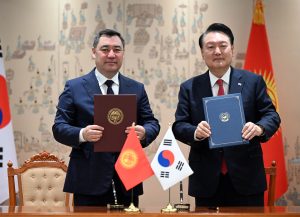Hours before he declared martial law in a shocking televised address, South Korea President Yoon Suk-yeol held talks with Kyrgyz President Sadyr Japarov. The two presidents agreed to elevate relations to a comprehensive partnership and vowed to deepen cooperation in trade, energy, mining, and other fields.
Japarov’s state visit to South Korea is the first by a Kyrgyz president in 11 years. Then-Kyrgyz President Almazbek Atambayev traveled to Seoul in November 2013 to meet with then-South Korean President Park Geun-hye to work on expanding relations. His visit was the first by a Kyrgyz president to South Korea since 1997. But when Park made her 2014 trip through Central Asia – visiting Kazakhstan, Uzbekistan, and Turkmenistan – she skipped Kyrgyzstan.
Park was impeached and removed from office in 2017.
Yoon visited Turkmenistan, Kazakhstan, and Uzbekistan in June 2024, rolling out South Korea’s new regional strategy, the “K-Silk Road” initiative.
Kyrgyzstan has often fallen behind its neighbors when it comes to Seoul’s top-level regional engagements, but as the recent state visit illustrated, there are plenty of areas of mutual interest.
The joint statement noted interest in enhancing trade and investment, with an emphasis on energy. A number of bilateral agreement were reached during the visit. Mining and hydropower projects, in particular, present opportunities for collaboration. One of the visit’s outcomes was a memorandum of understanding on “Cooperation in the Energy Sector and Key Minerals.”
Antimony was highlighted by Yoon’s office as of significant interest. Kyrgyzstan is estimated to have one of the largest reserves of antimony in the world, after China, Bolivia, and Russia. A so-called critical mineral, the metal is sought after for dozens of uses, including in batteries and semiconductors.
Another memorandum was signed between Kyrgyzstan’s Ministry of Energy and the Korean Water Resources Corporation (K-Water) on joint work toward a project involving 10 small hydropower plants.
Seoul is also keen on tapping into Central Asia’s geopolitical position. “Our government is paying attention to the strategic importance of Central Asia as a bridge between Asia and Europe,” Yoon said in his opening remarks.
Japarov also held talks with the speaker of the South Korean National Assembly Woo Won-shik and with noted South Korean politician and diplomat Ban Ki-moon, who served as secretary-general of the United Nations from 2007 to 2016 and is currently president of the assembly and chair of the Council of Global Green Growth Institute (GGGI).
Japarov invited Yoon to make an official visit to Kyrgyzstan and endorsed Yoon’s plan to host a summit with the five Central Asian states in South Korea in 2025.
Whether any of these ambitions come to fruition will depend heavily on what happens next in South Korea and how long Yoon manages to cling to power. Following the late-night martial law declaration, the Kyrgyz president’s press secretary told 24.kg that the state visit is going according to plan and the delegation would return to Kyrgyzstan as scheduled on December 4.
































